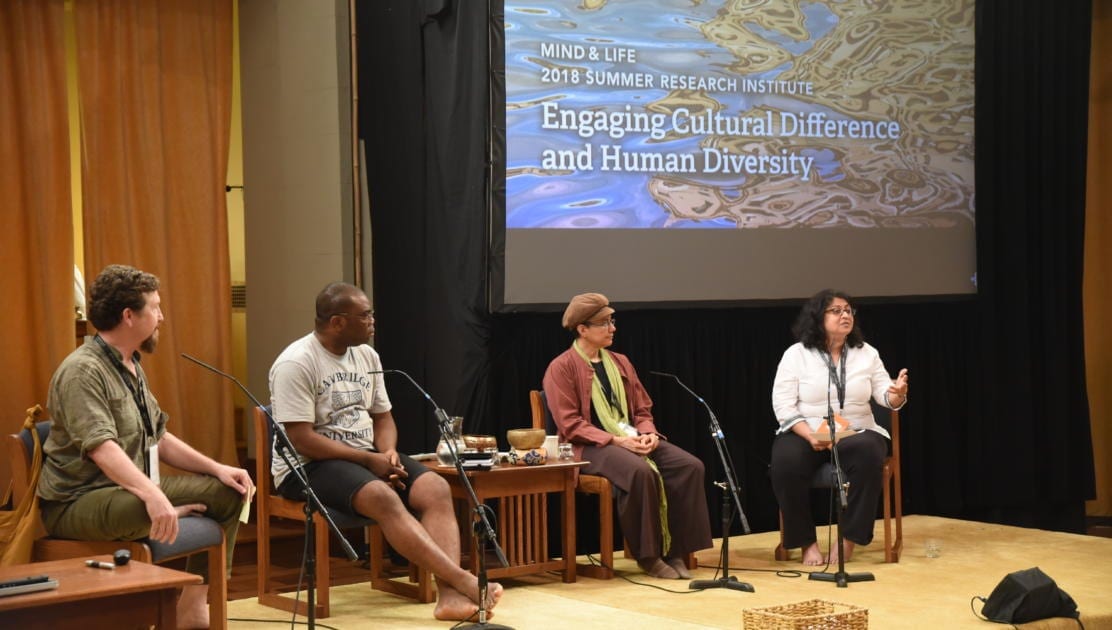The Geopolitics of the Other
By Garrison InstituteHow do we emotionally and socially construct our notions of difference and “the other?” Are there core truths about otherness and racial bias that transcend geographic boundaries?
In June, more than 130 scientists, scholars, students, and activists from 19 countries gathered at Mind & Life’s 15th Summer Research Institute (SRI), each held at the Garrison Institute. This year’s theme,“Engaging Cultural Difference and Human Diversity,” provided the opportunity for a deep dive into these and other questions at the heart of today’s growing divides.
The weeklong convening culminated in an engaging and heartful plenary: “The Geopolitics of the Other.” Three panelists, each of whom had migrated to the U.S. from the Global South, engaged the audience in an exploration of race, ethnicity, and identity as profoundly influenced by geography, history, religion, and culture. Acknowledging the bitter legacy of colonialism and oppression across the globe, the session surfaced practical strategies for individual action and collective healing.
“The label ‘people of color’ became my label.”
—Nilanjana Dasgupta
“The first time I became aware of race was when I came to the U.S.,” said panelist Nilanjana Dasgupta, Ph.D., who moved to the U.S. from India at 18 to study biology and stayed to pursue a career in neuroscience. “The label ‘people of color’ became my label,” she said. In India, her skin color was irrelevant, but as she traveled to different parts of world, the sense of being “the other” manifested in challenging ways, especially as a person from a colonized country.
“You can’t avoid the issue of context,” affirmed panelist Michael Onyebuchi Eze, Ph.D., whose upbringing in Nigeria was profoundly shaped by the nation’s colonial past. Later, while studying at the University of Cambridge in the UK, Eze was tagged as a cleaning person because of his race. “Sometimes the racism is unconscious,” said Eze, who has lived in more than a dozen countries. “We have to keep talking about it and can’t get involved in a conspiracy of silence.”
Panel member Marisela Gomez, Ph.D. also shared how her sense of identity as a Creole from Belize was impacted when she moved, begrudgingly, to the U.S. as a teen to be with her family. In her country, people were a mixture of many ethnicities: Spanish, indigenous, Mexican, pan-African, Scottish, English. In the U.S., she struggled with her racialized identity. “Racism is violent here, it hurts, and leaves an imprint,” said Gomez, now a mindfulness practitioner and community activist in East Baltimore.
Panelists questioned whether they could retain a sense of cultural and individual identity in the face of racial inequities and discrimination. Gomez effectively stopped being Creole, Dasgupta stopped being Bengali, and Eze was no longer Nigerian. Globally, color has meaning. The lighter you are, the better you are. This point was driven home by Eze. “My African culture can’t avoid colonialism. What is white is better,” he said. The context is not just geographic but religious, sociological, and political. History shifts how people see things.
So, what is the way forward in advancing social justice and fundamental freedoms? Panelists and audience members had much to say.
From the perspective of academia, we need to do a better job of bridging theory and practice, urged Dasgupta. This is why she attends the Mind & Life SRI, where change-makers can connect directly with researchers. New research and practice partnerships are needed, she added, that focus on localized solutions to big problems. Once proof of concept is achieved, it becomes a matter of adapting what we know works to other contexts.
Lobsang, a Buddhist monk, spoke up on the role of contemplative practice. “Being mindful of history is important so you don’t repeat the same mistakes,” he said. Also critical is the Buddhist philosophy of oneness. “There’s always an in-group and an out-group in society,” he pointed out. “One way to reduce that gap is to maintain a sense of sameness.”
“Everybody has a unique gift. Every time I meet someone different than me, they recreate me. They’re a kind of divinity to me.”
—Michael Onyebuchi Eze
Citing ancient African wisdom, Eze distinguished between honoring sameness and embracing difference. “Our difference is a gift to each other,” he said. “Everybody has a unique gift. Every time I meet someone different than me, they recreate me. They’re a kind of divinity to me.”
Equally important is creating safe spaces that nurture dialogue and deepen understanding of complex issues related to oppression and injustice. Convenings such as the SRI were held up as unique spaces where people from diverse backgrounds can deepen their knowledge and develop skills to be change leaders, no matter what their area of expertise.
Poignant and humbling was Eze’s encouragement that we each remain committed to justice and equity in the midst of constant cultural shifts. “We think of revolution as an event that ends and it’s time to move,” he said, citing hopes of a post-racial society emerging in the U.S. in the years of the Obama presidency. “The context is always shifting,” he concluded. “The revolution is timeless.”
Given this reality, panelists emphasized the need for personal accountability and maintaining a regular practice of contemplation. For Gomez, change flows through combining contemplation with action. To nurture clarity, social justice advocates need to take time for self-care, contemplation, and joy,” she said. “It’s not just Buddhist practice,” she noted. “It’s any practice that cultivates the moments where we can take care of the difficulties. We then take that practice of love, intention, and oneness out into the world.”
